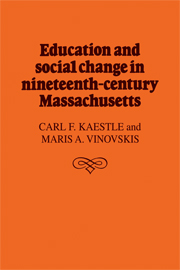Book contents
- Frontmatter
- Contents
- List of tables and figures
- Preface
- 1 Education and social change: Massachusetts as a case study
- 2 Trends in school attendance in nineteenth-century Massachusetts
- 3 From apron strings to ABCs: school entry in nineteenth-century Massachusetts
- 4 The prospects of youth: school leaving in eight Essex County towns
- 5 From one room to one system: the importance of rural–urban differences in nineteenth-century Massachusetts schooling
- 6 Education and social change in two nineteenth-century Massachusetts communities
- 7 Trends in educational funding and expenditures
- 8 The politics of educational reform in mid-nineteenth-century Massachusetts
- 9 Conclusion: the triumph of a state school system
- Appendix A Statistical tables
- Appendix B Definition of the variables contained in Tables A2.1 through A2.5, Appendix A
- Appendix C Discussion of adjustments, estimates, and extrapolations made in calculating Tables A2.1 through A2.5, Appendix A
- Notes
- Bibliography
- Index
2 - Trends in school attendance in nineteenth-century Massachusetts
Published online by Cambridge University Press: 05 October 2010
- Frontmatter
- Contents
- List of tables and figures
- Preface
- 1 Education and social change: Massachusetts as a case study
- 2 Trends in school attendance in nineteenth-century Massachusetts
- 3 From apron strings to ABCs: school entry in nineteenth-century Massachusetts
- 4 The prospects of youth: school leaving in eight Essex County towns
- 5 From one room to one system: the importance of rural–urban differences in nineteenth-century Massachusetts schooling
- 6 Education and social change in two nineteenth-century Massachusetts communities
- 7 Trends in educational funding and expenditures
- 8 The politics of educational reform in mid-nineteenth-century Massachusetts
- 9 Conclusion: the triumph of a state school system
- Appendix A Statistical tables
- Appendix B Definition of the variables contained in Tables A2.1 through A2.5, Appendix A
- Appendix C Discussion of adjustments, estimates, and extrapolations made in calculating Tables A2.1 through A2.5, Appendix A
- Notes
- Bibliography
- Index
Summary
The “sleepy” period: enrollment levels in the American Northeast, 1800–1840
Leading political theorists of the Revolutionary generation considered an educated citizenry essential to the survival of the American republic. Some, like Thomas Jefferson and Benjamin Rush, devised plans for systems of common schooling. But these plans generally came to naught, and the discussion of them has too long dominated the educational historiography of this period. If the fragile American nation could be saved only by an educated citizenry, and if an educated citizenry could be maintained only by a state system of common schools, why were two generations of town officials and state legislators so lackadaisical about providing systematic, universal education? Why was there a lag of forty years between the creation of the republic and the creation of a state board of education in Massachusetts?
Perhaps the public did not share the anxieties of the Founding Fathers about the American polity. Perhaps they shared their anxieties but did not share their faith that schooling would preserve republican institutions. Perhaps, on the contrary, they agreed with both propositions but believed that schooling in their society was ample and that most children received the kind of rudimentary intellectual and moral training the political theorists had in mind, even though much schooling was neither publicly controlled nor free. We believe that this third explanation best fits the evidence, and we believe that research into the educational history of the early United States should, for its central focus, turn from the unfulfilled plans of political elites to local patterns of schooling and other forms of education, that is, from the intellectual to the social history of education.
- Type
- Chapter
- Information
- Publisher: Cambridge University PressPrint publication year: 1980

